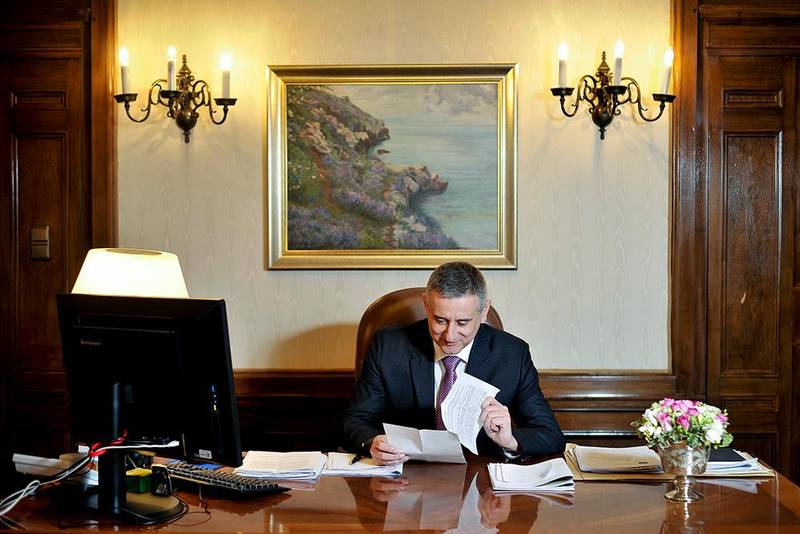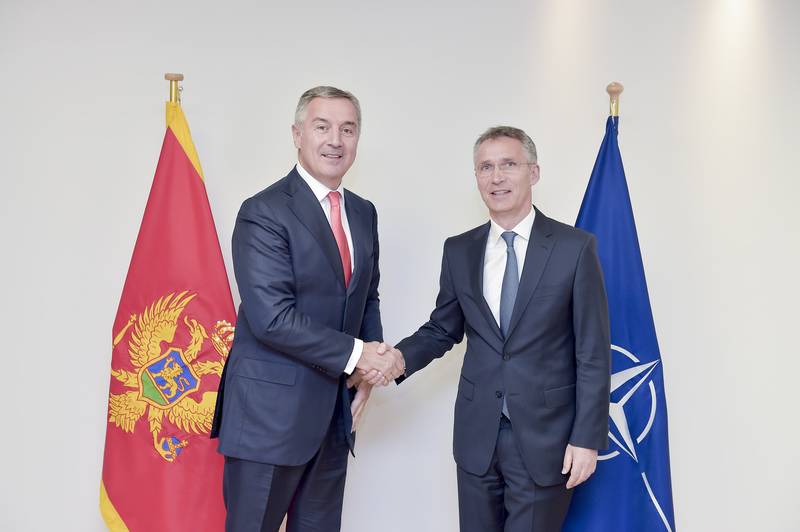Croatian Reformists Put Themselves in the Situation of the Bulgarian Ones
Adelina Marini, May 23, 2016
A true drama unfolded last week (May 16–22) in several South-East European countries. In Croatia, first Deputy Prime Minister Tomislav Karamarko is testing how high is the Croats' integrity benchmark raised and, in Bulgaria, the nationalists of the Patriotic Front waged a war against civil society. Meanwhile in Kosovo, the first Pride parade happened, Montenegro took another step towards NATO, Serbia refused to cooperate with the Hague tribunal and preliminary parliamentary elections in Macedonia have been postponed.
How do you say “integrity” in Croatian?
The “Consultant” affair in Croatia got to a new high during the past week after the conflict of interests commission announced it was launching a procedure for establishing the presence of conflict of interests in the relations of the first Deputy PM and his wife Ana Karamarko. The scandal unfolded after the weekly magazine Nacional revealed the fact that the wife of leader the largest political party in the country – the Croatian Democratic Union (HDZ) – has started her PR business with a contract for consultancy services with the lobbyist Josip Petrović, who is also friends with Tomislav Karamarko. Petrović is lobbying for the Hungarian petrol company Mol, which holds the control share in the Croatian petrol company Ina.

The subject became especially sensitive in Croatia after, exactly because of the transfer of Ina management to Mol with suspected corruption involved, former Croatian PM Ivo Sanader was convicted. Currently, Josip Petrović is suing Croatia for damages. Exactly how did the young and pretty Ana Šarić – still a mistress of the opposition leader at the time – managed to win such a lucrative contract is one of the sources of suspicion. Another source is the fact that, although the contract was signed before they were married, it was still valid up to the moment when Mr Karamarko became part of the government, which puts the party in a very delicate position.
This week Tomislav Karamarko started a mass media attack by giving interviews for the three large national television channels in an attempt to limit damages. Instead, he tangled himself even more. He pleaded that his family be left alone, accused the opposition of an attempt in destabilising the country and stated there was no moral issue in the case. In order to support his argument he stated that he himself asked the conflict of interests commission to assess whether such conflict existed or not. According to many in Croatia, however, the anti-corruption prosecution should be dealing with the case, not the commission. The current situation with the HDZ leader places the party itself in a very uncomfortable position and in a moment of severe political crisis in the country at that.
At the background of the consultancy affair another problem unfolded – parliament was blocked for three weeks because quorum was impossible to reach at the regular Friday votes. The main culprits turned out to be from ... HDZ. The party leader was forced to tighten ranks, which boomeranged back at him. During the previous term, an appearance of Tomislav Karamarko in parliament immediately made Croatian media news, his appearances there were so rare. And now he was forced to tell his fellow party members that they cannot go on like that any longer. The news of the week was that quorum was reached on Wednesday, but only in order to vote to stop the allowances for the office of former president Stipe Mesić.
The reformists from Most of independent lists – the junior coalition partner – turned out to be in the most unpleasant position. Currently, they are backing the very thing they fought against in the pre-election campaign and which turned them into the third political power – the status quo. In the name of remaining in power Most silently supported the trespassed Deputy PM by hiding behind the conflict of interests commission. They have not yet reached the virtuosity of the Bulgarian reformists of being in government and opposition at the same time, but this is probably yet to come. The opposition entered this week a vote of no confidence against Tomislav Karamarko. In order to win the vote they will need votes from Most. It is very likely that a repeat of the scenario of the Bulgarian Reformist Block is going to unfold, which will put an end to this political power in its current form.
To bang a protester
In all their swimming towards the bottom, Croats are still far away from the achievements of Bulgarian politicians. In Bulgaria, last week, the majority overthrew the veto that president Rosen Plevneliev placed on the latest changes in the Election Code, which limit the rights of Bulgarians living abroad to vote in national elections. The amendments were entered at the request of the nationalist and eurosceptic party Patriotic Front, a junior coalition partner, which entered government at the request of Bulgarian reformists. According to the changes, Bulgarian nationals living abroad can only vote in embassies and consular offices. Additional polling stations will be opened only under very strict conditions. One of the theories is that the aim of these changes is to limit the influence of Bulgarian voters in Turkey, especially after the breaking apart of DPS - the Movement of Rights and Freedoms (a member of ALDE).

One sentence from last week, however, makes another theory much more probable. The famous journalist Polina Paunova from Mediapool (she writes comments for Deutsche Welle as well) shared on Facebook the following sentence, aimed at her by the leader of the Patriotic Front Valeri Simeonov “OOOOOOH, we banged ya all so nice, I’m so stoked...”. In a status to follow, she adds another sentence by Mr Simeonov, aimed at the journalist’s interlocutor: “Yo, that one’s a protester!” In other words one of the goals of the amendments was to deal another blow to the protesters – the label attached to the most active people during the protests against appointing Delyan Peevski as boss of DANS in July of 2013. They formed a core for citizens’ pressure, which after the June protests, that lasted for months, sporadically organise various actions against planned legislation or outrageous government actions.
The protests further deepened the rift between the media empire of Delyan Peevski and the so called “free” media, which Mediapool belongs to. The theory of limiting the vote of Bulgarians in Turkey, however, is also quite plausible, for it is a marker of the inability of the state to deal with election violations, trading of votes, and lobbyist legislation changes. So far, the anti-democrats are in the lead against the protesters. It is time the European Commission joins the game. Unfortunately, this will hardly be possible before the annual dialogue on rule of law took place in the Council, which will be held on May 24. This date will be the last of a series of non-working days in Bulgaria.
The failure of the president’s veto was just one of the indicators that it is exactly the Patriotic Front that dictates Bulgarian society’s agenda, similar to the United Kingdom Independence Party (UKIP). Another one is the ban against wearing a burka in more and more cities in Bulgaria. A very well visualised investigation of the Dnevnik news daily shows how a ban is levied when there is no problem present. The subject again dominated the agenda of media in Bulgaria.
Serbia raises the stakes
With June approaching, when the official decision which chapters in the negotiations process with Serbia are to be opened is expected, tension rises again. After Croatia’s decision to veto the opening of the key Chapter 23 (justice and fundamental rights), initially because of the refusal to return Vojislav Šešelj to The Hague, last week a Serbian court refused to comply with the subpoenas of the Tribunal for Former Yugoslavia for three members of the Serbian Radical Party. The Supreme Court in Belgrade ruled on May 18 that there were no conditions for handing in Petar Jojić, Vjerica Radeta, and Jovo Ostojić. Serbia is obliged to comply with such requests only for those charged with the heaviest war crimes, genocide, and crimes against humanity. The three are only accused of disrespecting the tribunal and exercising pressure over witnesses in the Vojislav Šešelj case, state the Supreme Court’s motives.
This case once again brings to the agenda the question whether cooperation with the Hague Tribunal will continue to be one of the most important conditions in the negotiation process of countries from the former Yugoslavia with the EU, after the Tribunal itself placed serious doubts on its own reputation with the sentence against Šešelj.
NATO has expanded
Another piece of the Balkans geopolitical puzzle is about to find its place. This week foreign ministers of NATO signed the protocol for accession of Montenegro to the pact. It will, however, become an official member of the alliance after all member states ratify the protocol. Russia has repeatedly stated it was against the accession of the small Balkan state, which celebrated last week week ten years of independence. On May 21 of 2006 the people of Montenegro decided in a referendum to separate from the remains of former Yugoslavia and start on their own way. Montenegro is at the moment the only state in the enlargement process, which lacks serious problems, linked to unresolved bilateral issues. It does, however, show very slow progress in the process of European integration, especially in the most sensitive areas – the fight against corruption and organised crime and establishing rule of law.

In other news from the Balkans last week, Kosovo had its first gay-parade, led by President Hashim Thaçi. The parade happened on May 17 – the international day against homophobia. The pride happened with extremely strict security measures. Its peaceful passing is one of the key conditions in the EU integration process. Regarding the pride in Kosovo and the international day against homophobia, the leader of the eurosceptic and nationalist movement “Dveri” in Serbia, Boško Obradović, announced that sexual preference was not a human right. A theory, which is the exact opposite to institutional attitudes in the EU. When elected for First Vice-President of the EC, Dutchman Frans Timmermans (Socialists and Democrats) announced that sexual orientation is a fundamental right.
Obradović added that the movement would not support having the Pride in Belgrade, “because no one has the right to destroy public morale”. Pride parades in Belgrade almost always happen with extreme security measures and are never led by high-ranking members of the government. “Dveri” managed to join Serbian parliament after the preliminary elections on April 24 of this year.
The crisis in Macedonia continues
At the background of incessant protests in Macedonia, the preliminary elections that were planned for June 5th got postponed because of the sharp reactions, coming from Brussels. There is no new date set and no resolution of the political crisis so far, and the EC has no answer to the question what will happen, should the Pržino agreement fail.
The EU renounced its own rules
The European Union, too, is suffering of a political crisis, turning out to be completely incapable of agreeing on new community rules, or following them, when faced with the refugee wave. Until recently, the European semester, created in the epicentre of the euro area crisis aiming to prevent new economic and financial crises in the Union, was given as an example of successful European unity. Last week, however, the European Commission put an end to this project by practically announcing that rules do not apply during election time. At the presentation of country-specific recommendations – the culmination of the European semester – the EC postponed once again levying sanctions on Spain, Portugal, and Italy for systematic breaches of fiscal rules.
The arguments on Spain and Portugal are that these states do not have elected governments yet and Spain has new elections coming. The excuse in the case of Italy is that after prolonged negotiations it was agreed that fiscal rules flexibility will be a little more elastic concerning Italy. Keeping in mind that the EU is a union of 28 democracies, such arguments are completely groundless. And the fact that flexibility is a little more flexible for some breeds an atmosphere of disrespect to the agreed after much effort European rules. And if so far it was member states that veered from the rules, the compliance of the European Commission will have catastrophic results, for it abdicates from its role of a guardian of the Treaties.

This will surely fuel the ambition of German critics further, so that they request that rules be enforced by a supra-political body. Further elated will be the German voices, which want the removal of one of the most democratic things in the EU in latest years – having elections for EC boss (the so called Spitzenkandidaten Procedure). Such actions surely do not help in returning the trust of European citizens in European institutions and the reason for having supra-European rules. You can read more on the country-specific recommendations to Bulgaria here, and to Croatia - here.
Translated by Stanimir Stoev
 Kolinda Grabar-Kitarovic | © KGK
Kolinda Grabar-Kitarovic | © KGK Jozo Rados | © European Parliament
Jozo Rados | © European Parliament Aleksandar Vucic, Andrej Plenkovic | © Vlada RH
Aleksandar Vucic, Andrej Plenkovic | © Vlada RH Bakir Izetbegovic, Andrej Plenkovic | © Council of the EU
Bakir Izetbegovic, Andrej Plenkovic | © Council of the EU Aleksandar Vucic, Recep Tayyip Erdogan | © Serbian Presidency
Aleksandar Vucic, Recep Tayyip Erdogan | © Serbian Presidency Jean-Claude Juncker, Zoran Zaev | © European Commission
Jean-Claude Juncker, Zoran Zaev | © European Commission